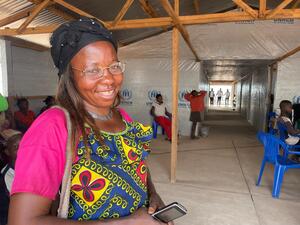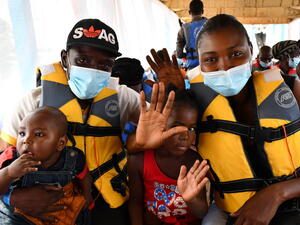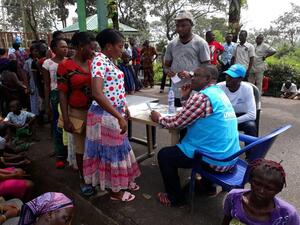UNHCR gathers 386 Sudanese refugees for landmark repatriation from DRC
UNHCR gathers 386 Sudanese refugees for landmark repatriation from DRC

A UNHCR convoy waits to cross the Democratic Republic of the Congo's border with southern Sudan on the road to the Alero way station.
KINSHASA, Democratic Republic of the Congo, September 13 (UNHCR) - The UN refugee agency on Wednesday began the landmark repatriation of almost 400 southern Sudanese refugees from the Aba area of north-eastern Democratic Republic of the Congo (DRC).
UNHCR staff said the operation began with the transfer of 386 refugees from their settlements in Oriental province to a transit centre in Aba, where they will be able to rest for the night and receive a hot meal. This is the first repatriation of Sudanese refugees in the Aba area, where most of the southern Sudanese refugees in the DRC are housed.
On Thursday, a UNHCR convoy will take them to the Alero way station near the southern Sudan town of Yei, where they will remain two to three days to receive relief packages and medical treatment. From Alero, the returnees will be taken to their villages in the Yei area as well as the Maridi, Yambio and Mundi areas.
"The beginning of this enhanced repatriation to South Sudan further confirms that the situation on the ground is increasingly conducive for repatriation" said Eusebe Hounsokou, UNHCR regional representative.
Return movements from Aba are expected to continue at a rate of one convoy a week over the next few months, with the next one due next Wednesday. "We hope to bring this operation to a close by the end of the year, but this is of course connected with our funding situation" said Hounsokou.
Many Sudanese refugees are eager to return to their country. The conclusion of a tripartite agreement between Sudan, the DRC and UNHCR in January this year paved the way for organised, cross-border voluntary returns. Out of some 5,000 Sudanese refugees accommodated in Aba, UNHCR and its partners have so far registered 3,200 refugees who expressed a wish to return.
This substantial turnout for voluntary repatriation is not the only sign that Sudanese refugees are keen to go home. Many have already returned without outside assistance, while earlier this year UNHCR organised "go-and-see visits" for a number of community leaders. They were able to see their villages, assess living conditions and meet with their home communities and the local authorities in south Sudan. Subsequently, they shared their experiences and impressions with the other refugees back in the DRC.
In terms of logistics, UNHCR faces serious challenges as the road conditions in the area are poor. "This repatriation is certainly a difficult one considering the remoteness of the areas, where you can find some of the toughest roads in Africa," Hounsokou said.
Upon arrival in Yei, UNHCR staff will provide the returnees with relief packages, including construction materials, household items and a three-month food ration supplied by the World Food Programme. They will also be given vaccinations.
Earlier this year, UNHCR organised several return movements to south Sudan from the Aru area, also in north-eastern DRC, which brought home more than 1,600 refugees. DRC still hosts some 13,000 Sudanese refugees, many of them receiving humanitarian assistance from UNHCR and its partners.
The refugee agency has been repatriating refugees from neighbouring countries since the end of last year, starting with Kenya and then followed by Ethiopia, Uganda, the DRC and the Central African Republic. So far, UNHCR has assisted 13,000 refugees to return to southern Sudan.
There are still 350,000 Sudanese refugees in camps in neighbouring countries - some for as long as two decades - and four million internally displaced persons from south Sudan, half in the south itself and half in the Khartoum and Kassala areas.
In addition to those repatriated by UNHCR, an estimated 100,000 refugees from neighbouring countries returned to south Sudan on their own before or soon after the signing of the peace treaty in January last year that ended 21 years of war.








